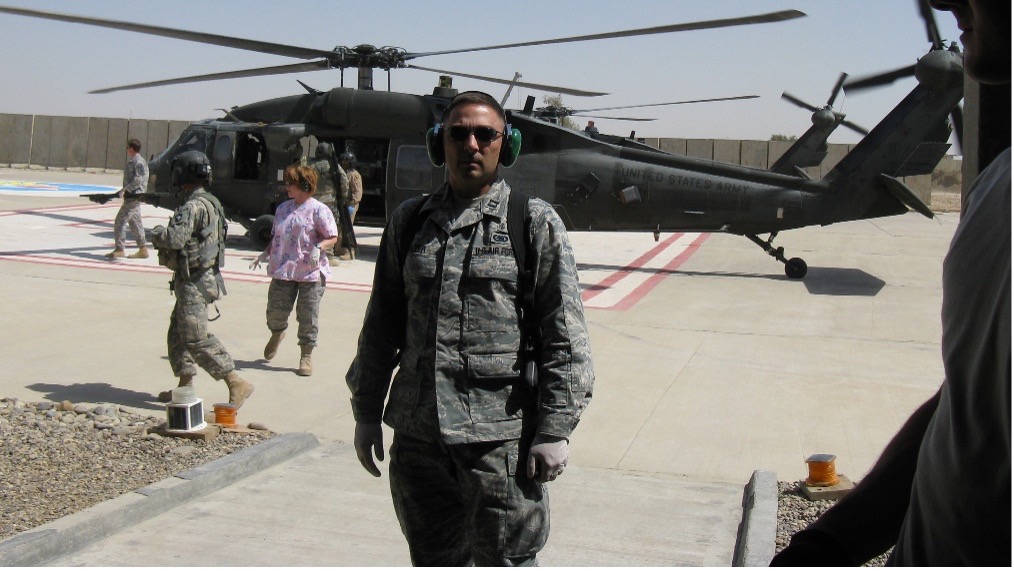We had the privilege to speak with our own Scott Miller, system director of purchased services at Advantus Health Partners, about his career at Advantus and his time in the United States Air Force.

Can you describe your role at Advantus Health Partners?
In my role of System Director of Purchased Services, I’m responsible for maintaining the contract portfolio for purchased services and non-medical supplies.
How did you get into this role?
The honest answer is because of Dan Hurry, the President of Advantus. I had worked with Dan Hurry earlier in my career and I was exposed to the kind of visionary he is. So, when there was the opportunity to join his team again, I jumped on it. In the words I jokingly said to Dan, “You had me at hello.”
How long have you been with Advantus?
I originally started at Mercy Health in July of 2017. Through mergers and reorganizations, the title has changed but has been the same work. (Learn more about Advantus’s story here.)
What is the most rewarding aspect of practicing in your field?
In supply chain, you are not a direct caregiver, but you are a catalyst of direct care. A phrase I like to use is that if it wasn’t for supply chain, you wouldn’t have a hospital, you would have a bunch of doctors standing in a field.
Is there anything you’re looking forward to about your future at Advantus?
Absolutely! Dan Hurry being the visionary, he is a leader among the team. The vision is to do things the way nobody else does them. We knew we could do health care supply chain better because we’ve been living in the hospitals and working in the hospitals and not detached. So, we are looking at how we can take those things that we’ve learned in an operational environment and get closer to bridging the gap between the financial and the operational. I’ve been in supply chain since 1985, and I’ve never been more inspired to be in supply chain more than I am right now.
What do you like to do when you aren’t working? Any hobbies or interests?
When COVID-19 happened and it didn’t matter where we lived anymore, I took my habit of enjoying the outdoors and fishing and moved to Tennessee. I live right outside the Smoky Mountains now and enjoy being outdoors, fishing, camping and hiking.
What were some of the reasons why you joined the Air Force?
When I was 17 years old, it was the mid-80s, during a recession. In my hometown of Allentown, Pennsylvania, there were no jobs or job prospects out of high school. So, I enlisted to help not be a burden to my family.
Is there any moment or memory from your time in the Air Force that stands out to you?
There are two moments that really stand out to me. For one, my time in the Air Force taught me that when you have a team of passionately committed people, you can get anything done. I could give one hundred examples of why that’s true.
The second moment is a war story about Iraq. I have done two tours in Iraq, and both times I had the same position of director of operations for the trauma hospital there, the largest war-time trauma hospital since the Vietnam War. One of the things that grabs you when you go to war is when everyday, as helicopters come in, you see the evidence of how savage and brutal humans can be to each other. Sometimes people lose a part of themselves. But, in that hospital and in that environment, doctors, nurses, technicians, everybody working together was a little slice of humanity. I used to describe it when I would write home as a bubble of humanity in a sea of insanity. In the worst of times, if there’s one thing that people need, it’s health care. People can find food, shelter, friendship and any other needs for themselves. But one thing people can’t find for themselves that has to be brought to them is health care.
Has your time in service impacted your career now?
I never forget that supply chain is not just boxes. Supply chain is making sure the right thing is in the right place at the right time for health care to occur. If I don’t do my job well, that means that health care can’t be delivered well. If I don’t do my job with passion, that means that someone down the line is too busy worrying about supplies and not able to put their passion towards their patient, where it belongs. At a recent team meeting, I was offered the opportunity to talk to the team and I reminded them that even if they’ve never worked in a hospital, they have a role in saving lives. Supply chain offers opportunity to reduce variability through the whole process and to address quality and avoid risk. One of the things that people don’t know about our contracts is that they’re chalked full of protections on legal issues, cyber issues and qualifications on the people providing services. If we bring in a nurse to support a case that is a contractor, you can be sure they’re qualified. All the things we do contribute to saving lives.
When you go to war, one of the things you don’t pack for is pediatrics. Nobody expects a child to be part of a war, but they live everywhere, and there are going to be casualties. In Iraq, we had a case come in of a 9-year-old girl with a bullet lodged in her neck. However, they did not have whatever was needed to protect her carotid artery so they could remove the bullet, it did not exist in Iraq. The supply chain team understood what needed to happen and they made sure the right material was in the war zone within 36 hours. That only happens when people do their job the right way every time so that, when the moment comes to shine, you have your established footprint and relationship and you’re able to make that kind of magic happen. I have so many examples of when supply chain professionalism has laid the groundwork for when it comes time to be creative in hours of desperation, they can deliver the miracles.
Advantus Health Partners would like to thank Scott and all of our veterans for their service and bravery. You inspire us to always be committed towards our goals and never give up on our hopes.










